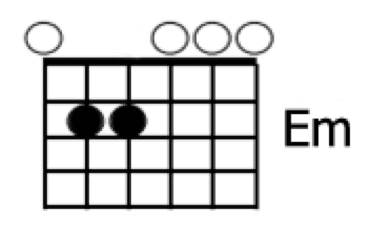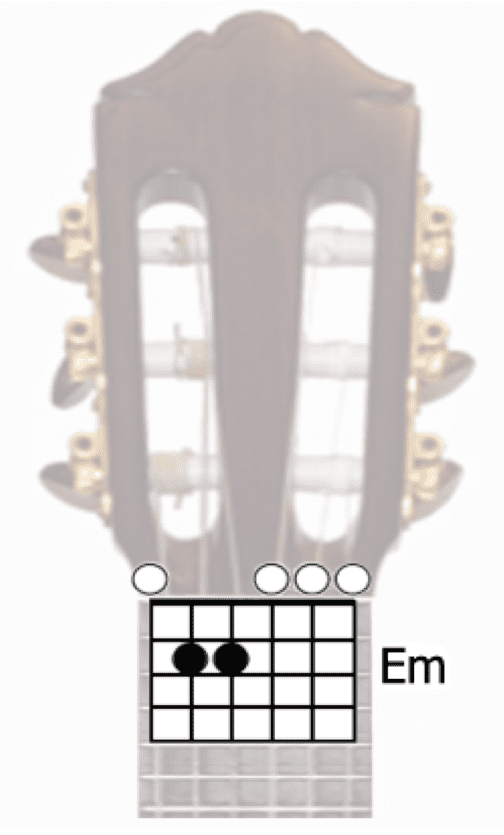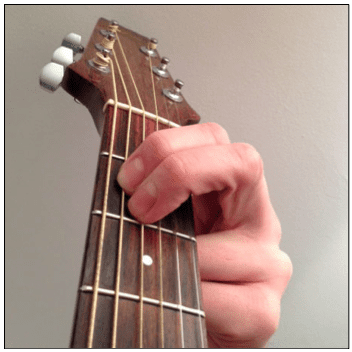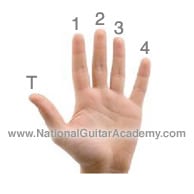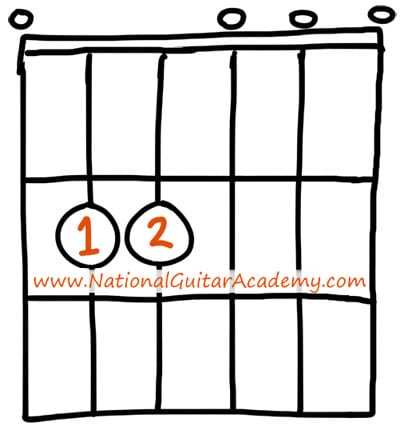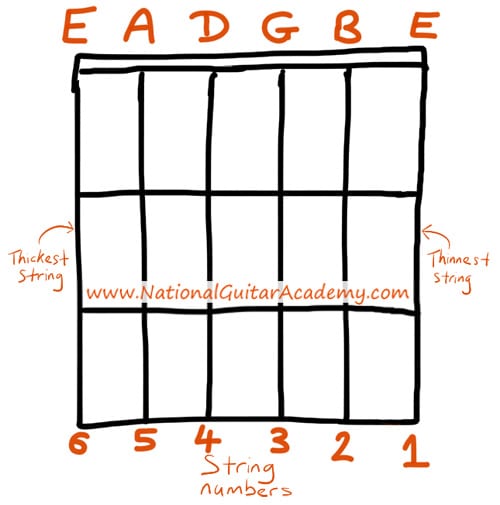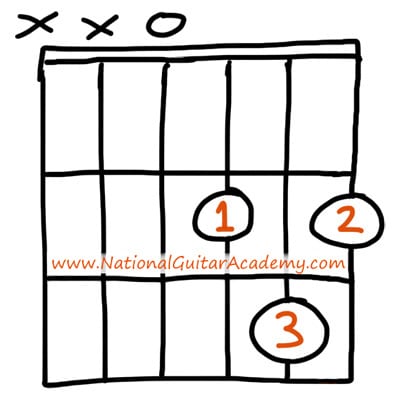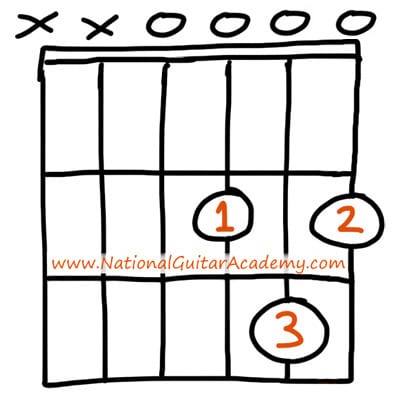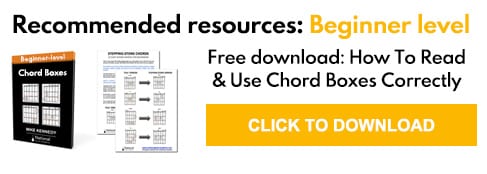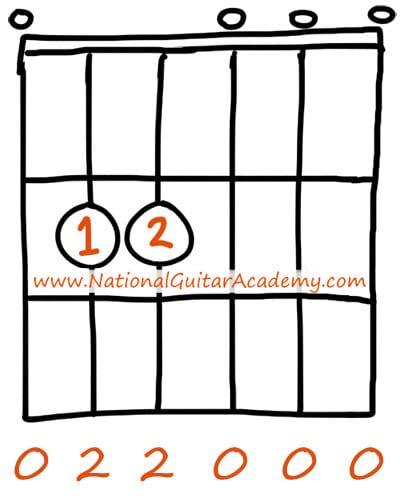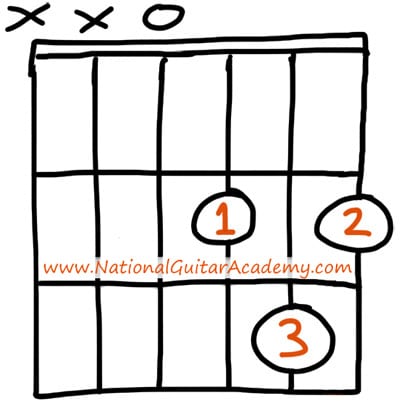If you want to learn the guitar you must be able to understand how to read guitar chord boxes.
Don’t worry, it’s easy! (It’s nothing like learning sheet music.) It’s very visual and within a minute or so you will understand it perfectly.
Over 100,000 guitar-learners get our world-class guitar tips & tutorials sent straight to their inbox: Click here to join them
What is a chordbox?
A chordbox is how one guitar player tells another where to press down on the fretboard to play a given chord.
Let’s look at an example. We’ll look at the chord box for Em. (Remember, whenever you see a lowercase ‘m’ it denotes a minor version of a chord. For example “Am” is A Minor, “Dm” is D minor and so on.)
Example chordbox
Looks a bit technical? It’s actually not technical at all, so don’t worry.
What you’re looking at here is simply a visual representation of your fingers (the black circles) pressing on the fretboard (the grid).
This next image should help make things clearer:
Take 5 minutes to digest and understand the photo above and the image below.
Don’t worry if it takes a few minutes for this to ‘click’ in your mind, it takes everyone a little while to comprehend.
A chordbox in real life
Here’s what the above Em chordbox looks like in the flesh:
To play this chord we strum all six strings.
- Two strings are what we call ‘closed’ because your fingers are pressing on them.
- The other 4 strings are what we call ‘open’ because you aren’t pressing on them, but they are still strummed.
That’s it!
Spend a few minutes reviewing this and getting comfortable with it. It’s very important you understand chord boxes.
If this still hasn’t ‘clicked’ in your mind, then you may find it useful to re-read this article from the beginning.
Here’s some extra questions that people often ask me about chordboxes…
Sometimes I see chordboxes with numbers inside, instead of solid black dots. What does that mean?
The numbers correspond to your fingers. Like this:
So if we go back to our Em chordbox…
… you can see that instead of two black dots, we see a ‘1’ and a ‘2’. This is because sometimes we want to SPECIFY exactly what fingers should be used. In this case, you should use fingers 1 & 2 to fret your Em chord. Again, in the flesh, it should look like this:
Can you see how fingers 1 & 2 are being used?
Ok, so is this related to string numbers too?
No. Not at all. Your fingers have numbers, like this:
AND the strings have numbers too, like this:
Learn 12 EASY beginner chords with our popular guide
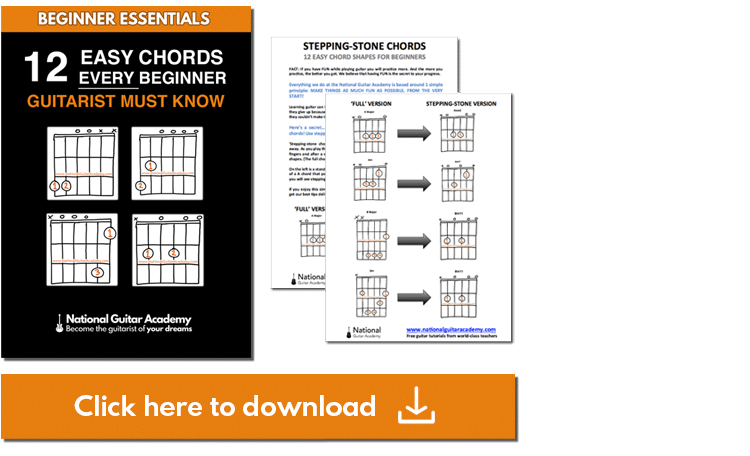
✅ Stop struggling. Start making music.
✅ Learn beginner-friendly versions of every chord.
This is our most popular guide and it will improve your chord ability quickly! 😎
Get your own personalised guitar-learning plan 🎸
Get a custom guitar-learning plan here: Click here for GuitarMetrics™
World-Class Guitar Courses 🌎
Learn from the world's best guitar educators: Click here for our guitar courses
I’m confused!
Don’t be! Let me make it clear:
- Your fingers have numbers
- The guitar strings have numbers
- The numbers inside chordboxes refer to your fingers.
What does it mean when I see an ‘X’ on a chordbox?
The X means ‘don’t play this string’. Here’s the chordbox for D:
As you can see, strings 5 and 6 have an ‘X’ above them. This means, don’t strum these strings.
Strings 4,3,2 and 1 are the only strings that we play when we want to voice a D chord like this.
We know this because you can see the ‘0’ above string 4 and we assume that you are going to strum strings 3,2 and 1 if you’re going to the trouble of fretting notes there!
If we wanted to make this even clearer, we could draw the chordbox like this:
On this example we have four circles above strings 1,2,3 & 4, but really, 3 of those circles are redundant. Of course we’ll strum strings 1, 2 and 3 if we’re going to put our fingers there!
Sometimes I see chords written as numbers. What does that mean?
Sometimes people don’t have the means to draw a chordbox. (For example, in a comments box on a website, or Facebook etc.) So in this situation guitarists write the chords out numerically.
In this format, this is what the ‘chordbox’ for Em looks like: 022000
In this situation, the six numbers are showing you what frets to press down. (Because of the restrictions of communicating like this, we can no longer specify finger numbers.) And the order of the six digits corresponds to the six guitar strings: EADGBE.
Can you show me an example?
Sure. In this scenario of our Em chord, the numbers ‘022000’ are a concise way of writing all this:
6th string (E) = 0 (This means strum this string ‘open’, without any fingers touching it.)
5th string (A) = 2 (This means press your finger on the 2nd fret and strum this string.)
4th string (D) = 2 (This means press your finger on the 2nd fret and strum this string.)
3rd string (G) = 0 (This means strum this string ‘open’, without any fingers touching it.)
2nd string (B) = 0 (This means strum this string ‘open’, without any fingers touching it.)
1st string (E) = 0 (This means strum this string ‘open’, without any fingers touching it.)
What about when I see the numbers flowing downwards?
Sometimes people will write the same chordbox (‘022000’) like this:
0
2
2
0
0
0
This is the same chord (Em), but it’s being written downwards instead of horizontally.
Confusingly, people sometimes screw this up and write all these numbers in the wrong order because they start writing them from string 1! (So they’re basically writing the chord in reverse. Don’t blame me folks, this is the internet!!)
The important thing is that you can see how the ‘022000’ matches the frets that we play. Can you spot it?
What about if I see an ‘X’ in this written format?
The same rule applies for an ‘X’ too.
So our D chord, could be written like this: XX0232
Or like this:
X
X
0
2
3
2
Whichever direction the chord is written in, the goal is to play this chord:
Can you see how the XX0232 matches this?
What’s the difference between a chord and a note?
A note is single, solitary pitch. (When you pluck just one string.)
A chord is a collection of notes, played together.
A good way to think about this is: Notes are like letters. Chords are like words.
I hope you enjoyed this article?
I hope you enjoyed this article and feel like you have a better understanding of what chordboxes are and how to read them. It’s like most new things, it seems weird and confusing at first, but very quickly you’ll find that you can read them without even thinking about it.
What Type of Guitarist Are You?
Take our 60-second quiz & get your results: Take The Quiz
Join the world's best online guitar school 🌎
- Get your own personalised guitar learning plan (customised just for YOU).
- World-class online guitar courses. Learn at your own pace.
- Community Campus & Learning Forum - A friendly community! Connect with our team & students. 😊
- Beginner Song library with chordsheets, tabs and tips. (Songs suitable for all levels!)
- Regular live streams, seminars and Q&A sessions - Learn from world-class guitar educators. Get all your questions answered!
Click here to learn more about National Guitar Academy membership 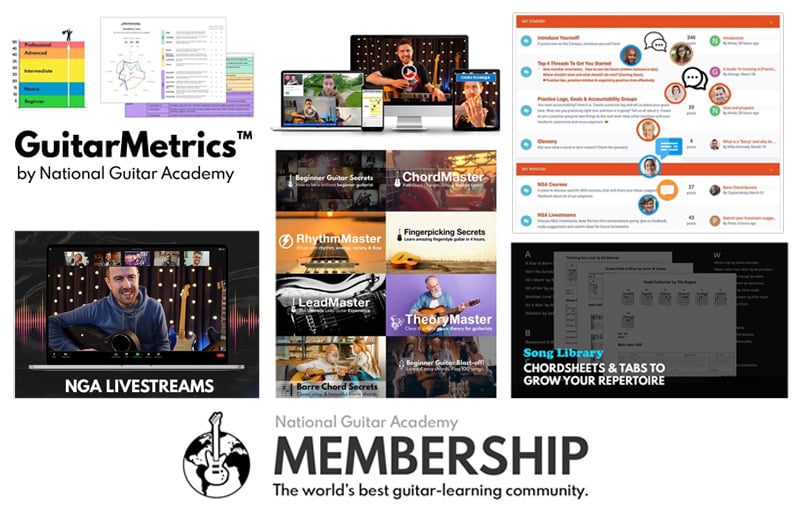
Cool Guitar T-shirts 😎
Look cooler! Check out our merch: Click here to see our merch store
Want free guitar tips and video lessons delivered to your inbox?
Join over 100,000 guitar-learners and subscribe to our guitar-tips-by-email service. (It's free.)
We'll send you a series of lessons that will move you to the next level of your guitar journey.
Learn how everything fits together quickly, easily and effectively. We share ninja tips (for instant fun!) but also timeless fundamentals that will deepen your understanding.

Popular Lessons
How To Learn Guitar: An 11-Step Programme For Beginners
How To Choose The Perfect Beginner Guitar
More Cool Guitar Stuff
Learn about National Guitar Academy: About Us
Join us on Facebook for daily guitar tips.
Listen to our Learn Guitar Podcast for rapid guitar progress.
Check out our free chord lessons.
Get our best guitar tips & videos
Where should we send it?
Get our best guitar tips & videos

